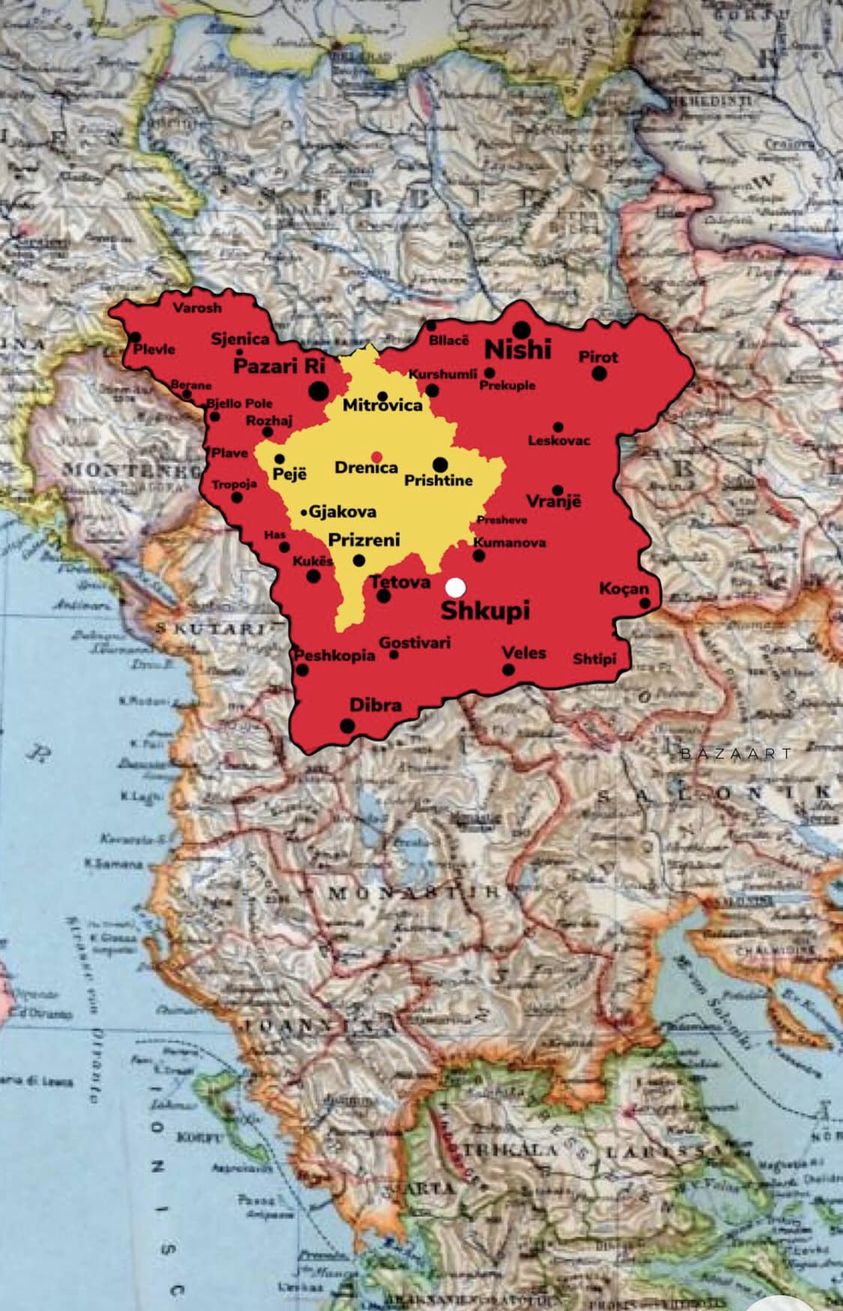The 30th OSCE Ministerial Council, showed the shadows looming over the Balkans. Serbia’s unchecked aggression, spineless alliances, and Lavrov’s deflections reveal a precarious geopolitical dance.
Thank you for reading this post, don't forget to subscribe!In the grandeur of Skopje, North Macedonia, the 30th OSCE Ministerial Council Meeting unfolded from November 30th to December 1st, 2023, assembling a cast of prominent figures, notably U.S. Secretary of State Blinken and Russia’s Foreign Minister Lavrov. Amidst the seemingly weighty discussions on global predicaments such as the war in Ukraine, violence against women, and climate change, this journalistic exposé hones in on the labyrinthine political theatrics, particularly the enduring conflict in Ukraine and Serbia’s relentless onslaught against Kosovo.
Secretary Blinken and Minister Lavrov injected a palpable geopolitical frisson into the proceedings, with Lavrov hurling undiplomatic salvos at Western diplomats. Yet, beneath the surface of diplomatic decorum lies an intricate dance where geopolitical manoeuvres take precedence over earnest discourse.
This piece is not just an exploration of diplomatic grandstanding; it is a spotlight on the evasive manoeuvres executed by key players. The U.S. Ambassador to OSCE, Michael Carpenter, and the Chairman of this year’s OSCE Ministerial Council, North Macedonian Foreign Minister Bujar Osmani, alongside Russia’s Sergei Lavrov, sidestepped the questions that needed addressing probing a discernible shift in Western diplomatic policies. What emerges is a disconcerting narrative—Western diplomats seemingly accommodating and appeasing Serbia’s destabilising role in the Balkans, while Russia clandestinely steers this destructive agenda.
This journalistic pursuit delves into the insidious convergence of interests, where East and West, driven by divergent motivations, paradoxically find common ground. Serbia, now propelled into the forefront of violence and potential warfare, becomes the unsettling locus of consensus between the powers that be. The evasion of probing questions, with Western journalists tacitly enabling their politicians and Eastern counterparts mirroring the act, unravels the intricate layers shrouding the geopolitical landscape of the 30th OSCE Ministerial Council Meeting in Skopje, North Macedonia. In this diplomatic theatre, where questions linger unanswered, the vulnerability of European security is laid bare.
In an address that aspired to rivet attention at the 30th OSCE Ministerial Council meeting in Skopje, OSCE Secretary General Helga Maria Schmidt championed the organisation’s purported commitment to addressing security challenges. While Schmidt’s ostensibly commendable focus on Ukraine resonates as the politically fashionable stance, the glaring oversight of critical issues in the Western Balkans reveals a collective myopia within the OSCE. This oversight is not merely a consequence of myopic vision but rather a deliberate negligence, perpetuating a political mindset that, paradoxically, endangers the security of the Western Balkans by allowing the region to be submerged in the perilous currents of a potential war.
Schmidt, with fervent eloquence, elucidated the OSCE’s purported endeavours in Ukraine, painting a vivid picture of dedication to mitigating the impact of war, fortifying democratic institutions, and grappling with issues such as human trafficking and climate change. However, her narrative faltered, conspicuously silent on the tangible mitigation of security and stability in Europe concerning Serbia’s relentless aggression in Kosovo and at least three other Balkan nations. Recent diplomatic skirmishes with Bulgaria only compound the regional turbulence, illustrating a stark failure on the OSCE’s part to address the broader spectrum of challenges faced by the Western Balkans.
The tensions between Kosovo and Serbia, perpetually on a simmer, show no signs of abating. Putin’s foothold in the Balkans finds an unsettling ally in Milorad Dodik, whose audacious claim that Serbs across the Balkans should unite under a single map, incorporating Kosovo, is not only a brazen display of ambition but also finds endorsement from Russia’s Foreign Minister Lavrov, who affirmed such sentiments during the Skopje proceedings. In this glaring omission and endorsement, the OSCE reveals its complicity in allowing a dangerous political sentiment to fester, one that jeopardises the already fragile security and stability of the Western Balkans. The organisation’s selective attention underscores a perilous bias that could have far-reaching consequences for the entire region.
In a brazen manoeuvre, Serbia, only a few months from Russia’s full-scale invasion of Ukraine and the subsequent imposition of sanctions by the Western world, inked an agreement with Moscow for supposed “consultations” on foreign policy matters. The deal, signed by the then Serbian Foreign Affairs Minister Nikola Selakovic and Russia’s Sergey Lavrov, outlined a two-year plan of foreign policy consultations. This seemingly incongruous alliance comes at a time when Serbia, with its bloody fingerprints all over acts of aggression, remains unscathed by any semblance of accountability from the EU and the U.S.
Serbia’s track record includes injuring NATO peacekeeping soldiers in northern Kosovo, kidnapping Kosovo guard policemen, and orchestrating an operation of roadblock as well as involving over 100 Russian-styled, heavily armed forces attempting territorial aggression against the Republic of Kosovo. Astonishingly, the EU and the U.S. exhibit a spineless reluctance to hold Serbia accountable for its destabilising actions in the Balkans.
The limpness of U.S. diplomacy is laid bare as Secretary Blinken makes a brief appearance in Skopje on November 29th, choosing not to stand alongside allies or confront his counterpart Lavrov during the OSCE Ministerial Council plenary sessions. Lavrov, in stark contrast, arrives a day later and proceeds to orchestrate a press conference the following day, denouncing Blinken and his allies as “cowards” for their failure to engage with his concerns. My attempt to question Lavrov during a press conference, held in an auditorium filled predominantly with Russian journalists, was met with orchestrated disdain and ultimately saw my microphone snatched away.
The exchange with Lavrov exposed the calculated evasions employed by the Russian Foreign Minister. When confronted with the destabilising role Serbia plays in the Balkans and its apparent alignment with Moscow, Lavrov, with a conspicuous display of amnesia, claimed ignorance of any agreement. Skillfully sidestepping questions about Kosovo, he deflected attention to the U.S., criticising its protests against Serbia for not joining Western nations in imposing sanctions on Russia. Lavrov’s persistent harping on sanctions, delivered with a passive-aggressive tone, offered a glimpse into the sensitivity surrounding their impact on Russia.
The spectacle of Lavrov attempting to leverage Israel as a pawn to sidestep a straightforward question is, frankly, a laughable display of diplomatic theatrics. His Excellency, it seems, is either blissfully unaware or willfully ignorant of the glaring parallels between Israel’s actions against the Palestinian people and Russia’s own war crime-laden aggression in Ukraine.
Lavrov’s feeble attempt to deflect attention from Russia’s invasive war in Ukraine by pointing fingers at Israel demonstrates a remarkable disconnect from reality. Israel, like Russia, has been implicated in egregious violations against civilians in its dealings with the Palestinian population. For Lavrov to draw a false equivalency and use Israel as a diversionary tactic only underscores a lack of substantive engagement with the pressing issues at hand.
It appears that his Excellency is operating in a realm of diplomatic delusion, where distracting maneuvers take precedence over acknowledging the weight of Russia’s actions. The attempt to paint Israel as a shield against scrutiny only serves to highlight the disingenuous nature of such tactics, leaving little room for serious consideration in the face of the stark realities of both conflicts.
The entire episode, from Blinken’s fleeting appearance to Lavrov’s orchestrated press conference, reflects a disconcerting reality: a diplomatic theatre where accountability and transparency take a back seat to political posturing and evasion. The brazen alliance between Serbia and Russia and the lacklustre response from Western powers underscore the precarious state of geopolitics, where aggression goes unchecked and diplomatic discourse descends into undiplomatic epithets.
Peeling Back the Layers of EU and US Diplomacy in the Balkans


Shënim:
Redaksia, diplomacia. dk nuk e merr përgjegjësinë për pikëpamjet e autorit në shkrimin e botuar!
Respekt!
